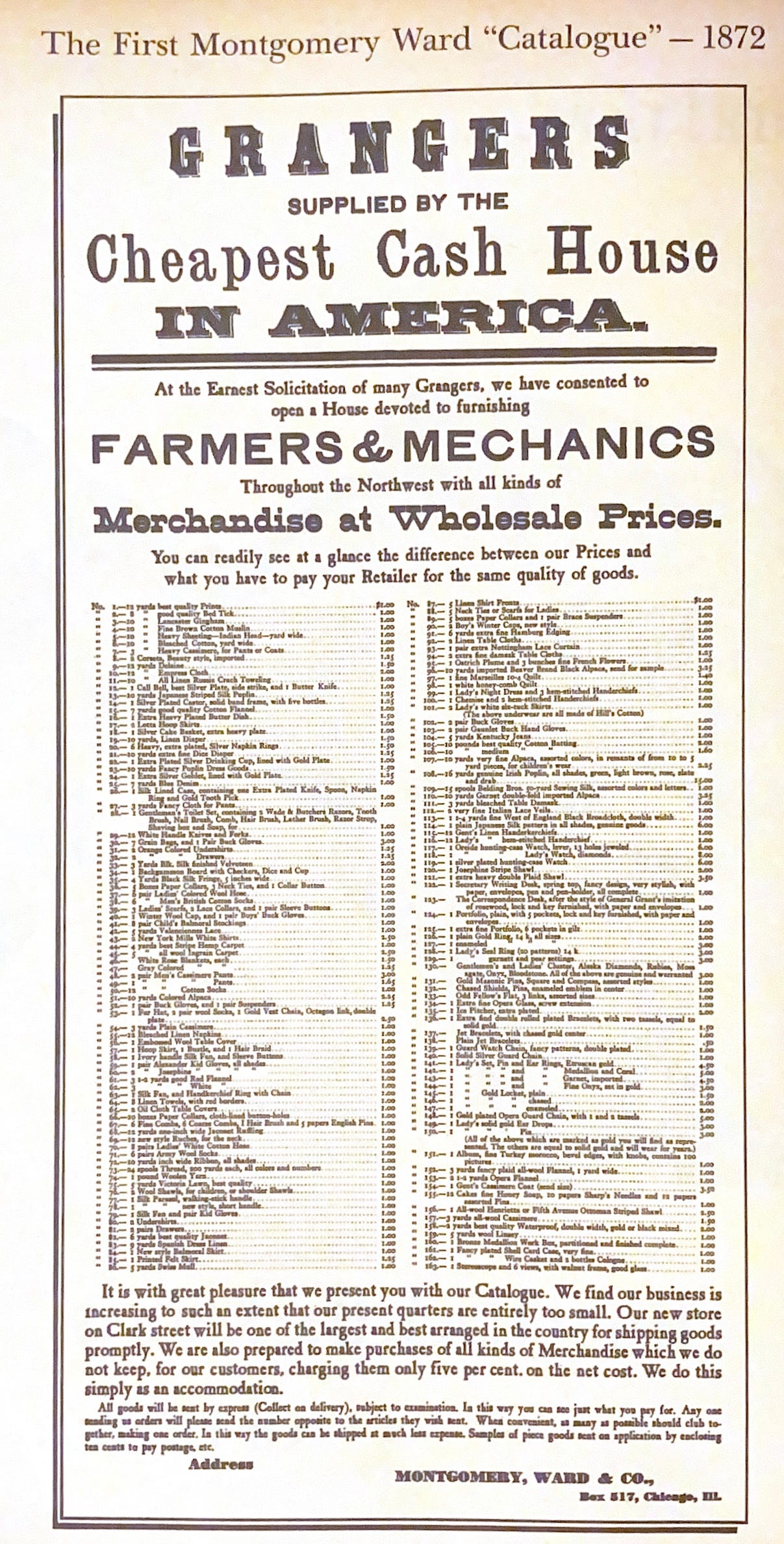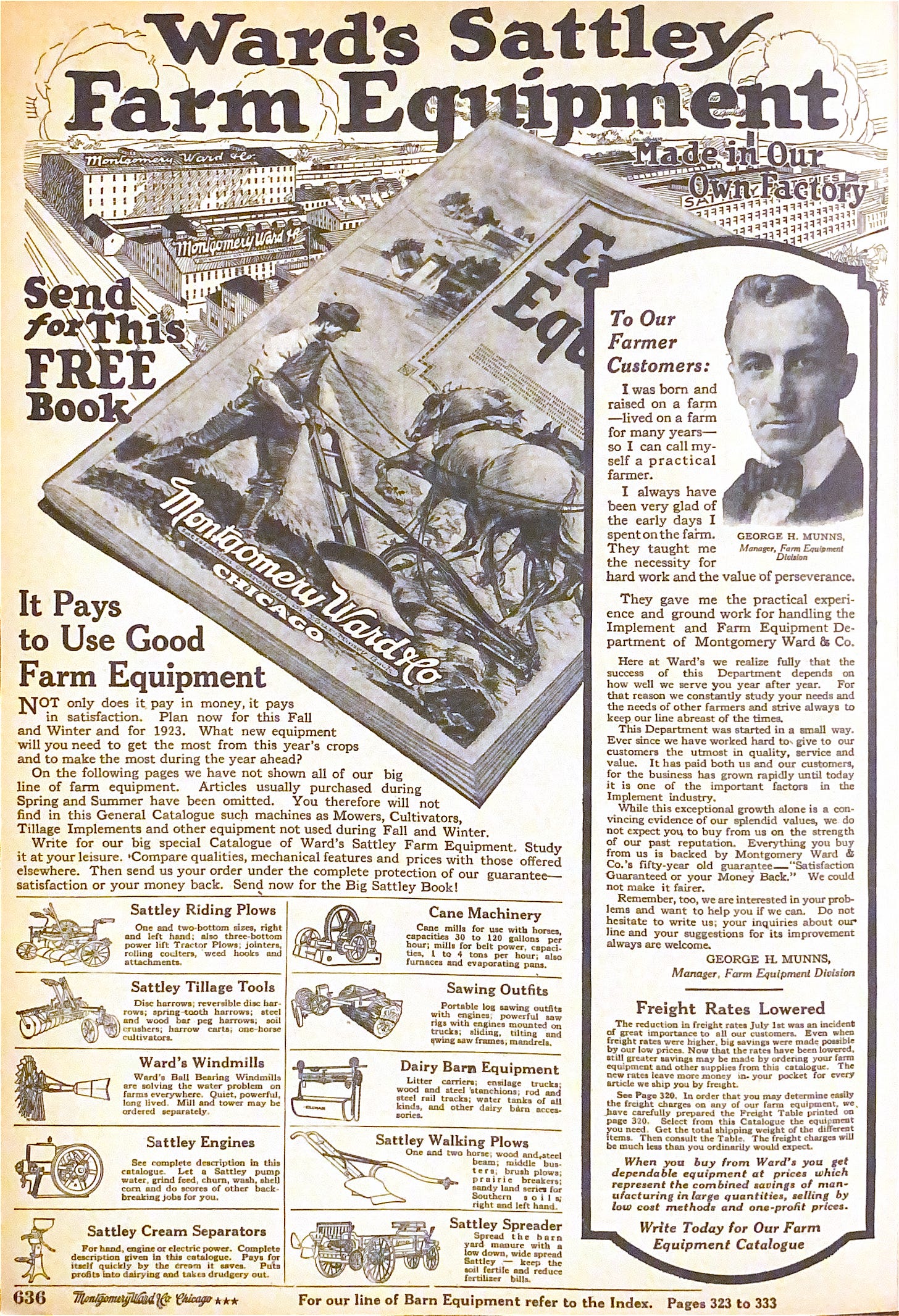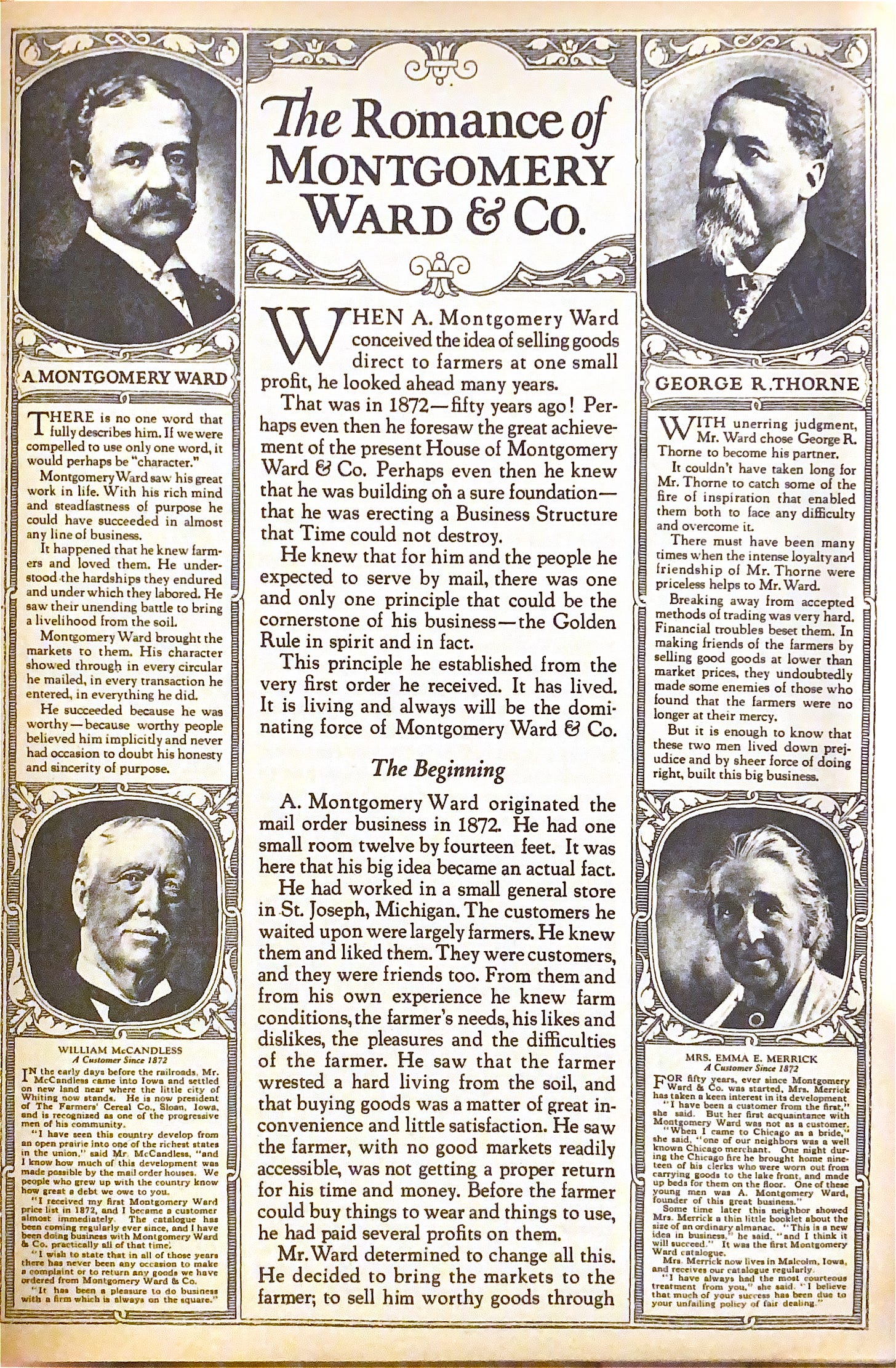After listening to the interview with my grandma I felt like I had been introduced to most of the characters involved in the story of Dear Mister Ward. There was just one left to meet, Mister Ward himself.
I took the title Dear Mister Ward from the salutation of one of the letters.
Most letters of course were addressed to Dear Montgomery Ward or something more generic like Dear Sirs. There was even one addressed to “Dere Monkees” taken from Montgomery Ward’s nickname “Monkey Wards.” What grabbed me about Dear Mr Ward was how personal it felt. There’s no way to know if this person actually thought they were writing to someone named Montgomery Ward, or if they even knew who Aaron Montgomery Ward had been. Either way it was emblematic of the relationship the customers clearly felt they had with this huge corporation. In order to fully appreciate the letters I felt like I had to learn more about the company that inspired them and to do that I had to learn about its founder, Aaron Montgomery Ward.
Aside from the research my uncle had done 40 years ago and my grandma’s recollections I started off knowing very little about Montgomery Ward. Having grown up in New England I had never been inside a Montgomery Ward store and had certainly never ordered from their catalog.
I began with the usual suspects of Google and Wikipedia. Resources which hadn’t even existed the last time I embarked on a research project in college in the late 90s. I had done a fair amount of family history research in recent years and am prone to occasionally obsess over a random topic but I rarely took it beyond cursory online searches. I got some leads from those early searches but quickly found that there were fewer serious sources for information about Montgomery Ward than I expected.
There is one lengthy out of print biography of Aaron Ward but since the cheapest copy I could find online was over $200 that will have to wait. There are a few books written by corporate employees and other people connected to the company including an unpublished manuscript in the Chicago Historical Society archives but none of those were readily accessible. I found some other journal entries and brief mentions but Sears Roebuck, perhaps because of their prevalence in urban areas has received far more scholarly attention than Wards.
Eventually I found the book The First Hundred Years Are the Toughest: What We Can Learn from the Century of Competition Between Sears and Wards by Cecil C. Hoge. This book was a goldmine of information. While a lot of the book is taken up with tracking stock prices and fluctuating revenues there is also plenty of information about Aaron Ward himself and the cultural impact of the company. It has become my main source for information about Montgomery Ward even though at first I had some concerns about bias. Hoge was a really big fan of Aaron Montgomery Ward. Almost everything in the book is complimentary towards him so much so that it sometimes seems too good to be true. However after checking out some of his sources I haven’t found much that contradicts his assertions.
Hoge only included a bibliography and no notes in the book. It makes for a pretty easy read but also made it a challenge to do further research on specific topics. I have managed to track down many of his sources and through them some others that he omitted.
Through these sources I’ve begun to see why Hoge respected Aaron Montgomery Ward as much as he did. Assuming most of the sources have a reasonable amount of objectivity Aaron Ward seems to have built his company on strong principals and a respect for his customers. His customers rewarded him through loyalty that often grew into an emotional bond to the company. Ward built his company one customer at a time and worked hard to maintain those relationships. He understood the needs of farmers and rural people both through lived experience and careful study. He listened to their needs and wants and found ways to build trust and loyalty. A brief examination of his biography gives us a clear idea of how he developed these principals and built the relationships that would define his company long after his death.
Aaron Ward had grown up in a farming community but he was not interested in living an agrarian lifestyle. He left school at 14 and tried working first as a cobbler’s apprentice, then in a barrel stave factory, and then at a brickyard. Manual labor did not suit him. He neither enjoyed it, not was he any good at it. He ended up working at a shoe store and that was where he found his footing.
The clientele of the store were mostly farmers and he not only provided good service but befriended many of them. He learned their likes and dislikes, their needs and desires when it came to products, and how to gain their trust.
Before long Ward’s ambition brought him from rural Illinois to the rapidly growing city of Chicago. He got a job as a traveling salesman for the company Field, Palmer, and Leiter who sold wholesale to small rural stores and operated what would become the Marshall Field department store.
Ward traveled throughout the rural midwest selling to small stores but also continuing to observe and interact with the people buying the goods. He witnessed the price gouging of local stores who had de facto monopolies on their local areas. He also saw how at each step along the supply chain someone took a cut which meant stores had to raise prices just to make ends meet.
At the same time the railroad and improvements in the postal service meant that farmers could access products directly through the mail. However there was an understandable skepticism by customers about ordering directly from manufacturers without seeing the products first hand. Newspapers and magazines were filled with ads for everything from new fangled farm machinery to medicines that promised to cure all sorts of ailments. The problem was there was no vetting process for the products or the companies advertising them. It was difficult to tell the scams from the genuine products.
At the same time department stores were starting to expand in cities. City folks could walk into a store big enough to hold the entire population of a small town and buy anything they could afford. And anything the store would sell on credit. Farmers however could ill afford to waste days traveling to the city every time they needed something.
Ward saw all of this and heard about it from his customers and friends. He saw an opportunity to bring the store to the farmers. He knew that by taking the middlemen out of the process he could offer more products at a lower price.
Aaron Ward wasn’t the only one fighting for farmers at that time. In 1867 Oliver Hudson Kelly had formed a secret society known as The Order of Patrons of Husbandry. The meeting places were known as Granges and eventually as the organization emerged from secrecy it became known as the National Grange. The Grange quickly became a cultural and political force representing the interest of farmers. The first “catalog” that Ward sent out in 1872 was a one page price list sent to 40 members of the Grange. They acted as a third party sponsor to vouch for his fledgling company.
Local granges were popular gathering places for farmers who otherwise often lacked a sense of community, living at the distance they did from their neighbors. Ward saw an opportunity to use Grange meetings as a place to connect with many of his customers at the same time and to show them that he wasn’t just another snake oil salesman. He went to meetings throughout the countryside and spoke with Grange members directly. He pitched them on the idea of grouping orders together to save money on shipping. He demonstrated products and elicited feedback. He asked for product suggestions and took requests. He essentially used them as an early form of focus group.
This strategy didn’t end as the company grew. For years Montgomery Ward would send representatives not just to granges or other community meetings but to customers’ homes. They would get feedback on their products and service directly from them, seeing how they used them and how they could serve them better.
As the catalog expanded to include images and eventually photographs it also included direct appeals from Aaron Ward and other employees. The head of each department was required to be an expert in their area and the catalogs included messages from and even photographs of them. The following is from a reprint of the 50th anniversary catalog from 1922.
It’s not hard to imagine the effectiveness of reaching out to people living in varying degrees of isolation with this kind of personal appeal. The folks who received these catalogs must have felt like they knew each of these section leaders.
By the time the 50th anniversary catalog was published Aaron Ward had been dead for almost a decade. He and his partner George Thorne had turned over control to Thorne’s sons way back in 1893. Aaron Ward, however continued on as president and even continued to write copy for many years. The company had gone through many changes in that 30 years, and even more by 1932 when my grandma started working in the St Paul office. None of the other company leaders ever supplanted Aaron Montgomery Ward as the face of the company. That is plain to see from the first page of the 50th anniversary catalog. Its entirely possible the person who wrote the letter addressed to Dear Mr Ward saw this catalog when it came out and expected that even if Aaron Ward wasn’t in charge anymore that it surely must still be a family business.
Even for those customers who were not under the illusion that there was still a Ward in charge of the company that level of connection was still there. Aaron Ward’s legacy lived on in that connection through the life of the company. That connection is at the heart of what makes the letters in Dear Mister Ward speak to us. It’s what I found relatable during lockdown from my own place of isolation and what keeps me coming back. It provides a unique window into a time and place that often gets overshadowed by the harrowing stories of soup lines and the dust bowl. Each letter represents an individual or family finding their way through that difficult time with some amount of assistance from Montgomery Ward and my grandma.
This concludes the series of posts telling the Story Behind Dear Mister Ward.
I hope this introduction was helpful and that you enjoyed reading it. It was also intended as a framework for future posts. I will continue to dig deeper on all of the topics mentioned. I hope to post every two weeks but I’m not sure it will be quite that regular. I spend all day at work staring at a computer editing memos and letters and reading old documents. I can’t always bring myself to do more when I get home. If you are enjoying the blog please comment, like and share so I know that someone is out there.









I found this story fascinating. I love history and reading this little tidbit of the people of Montgomery Ward was a jewel. I remember when I first got married in the early 1980s receiving their catalog in the mail!!!